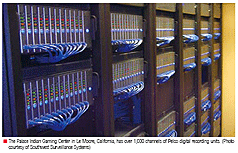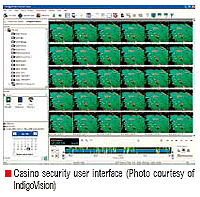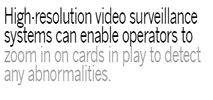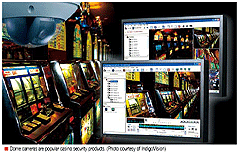Casino security involves a number of complex factors. A&S takes you through some potential security threats and the solutions posed for these.
Casino security involves a number of complex factors. A&S takes you through some potential security threats and the solutions posed for these.

Alan Zajic, Chairman of the Gaming and Wagering Council at ASIS International, recommends that surveillance operations have RFID systems, regardless of the annoying background chatter. On hearing of an incident, he suggested, more than one camera should be focused on the incident. Given the decrease in quality of VCR tapes used over and over, Zajic predicts the phasing out of analog technology by 2014.
Cameras, added Zajic, should be preset to a standard viewing location when not being moved by security agents. Views of the casino floor should be wide and have an overview effect. Choke points, such as main entrances, exterior restroom entrances and main aisles should be constantly monitored. Management should be watchful over agents responsible for moving cameras out of position and setting controls, in case of unsmooth movement. Cameras in preset areas, such as escalators, elevator doors, and valet parking ramps, are likely to catch routine incidents and should be covered by fixed cameras; patrons will perceive them as a proactive approach.
Surveillance cameras can also catch card counters, who track the value of cards to increase their chances of winning, said Joseph Kelly, Business Law Professor at Buffalo State University, New York. Despite efforts at disguise, cameras remain effective ways of identifying unwelcome players. In State v. Anderson, he continued, a surveillance camera noticed that the patron moved his toes often while playing blackjack. His toe movements corresponded to the appearance of certain cards on the table. After casino security officials confronted him, the patron, a computer expert, was taken to court. Some players create advantage by intentionally exploiting casino mistakes, such as those made by employees or malfunctioning gaming devices, said Anthony Cabot, Co-editor-in-Chief of the Gaming Law Review. A good example is during a casino's opening night. "They understand that errors are most likely to occur when a casino is in the midst of training employees and deploying several hundred or thousand new gaming devices."

Other security breaches involve technology. One of the biggest recent arrests involved MIT graduates in possession of blueprints to some slot machines. They reprogrammed IC chips, scoped out surveillance, and strategically placed people in front of certain machines before breaking into them. After opening the slot machine, they pulled out the mother board, replaced the IC chip with the preprogrammed one, and shut the slot machine doorall within 25 seconds. The group got away with millions before the perpetrators were caught when one member got into a fight with a casino patron over use of a slot machine. At that point, surveillance did a review to see why they were fighting and they noticed gang members opening up the machine to put a different chip inside.

"This incident could have easily been prevented with an integrated system in which any breach of security on any slot machine creates an alarm; and an operator would have seen it immediately," said Scott Bartlett, CEO of Southwest Surveillance Systems (SSS). "Conversion to digital recording and integration that comes hand-in-hand with this will prevent most major scams. This, coupled with video analytics, will make a tremendous impact on future theft attempts."
In another case, a well-known London casino lost US$2.6 million to a team of players who used cellphones and pocket computer technology to predict winning numbers on a roulette table, revealed Tracy Tye, Casino Account Manager for IndigoVision. Using this cheating method, determining the exact number is not necessary; but a prediction of a general area on the wheel will eliminate the house advantage. Transmissions between the wheel clocker and bettor could have been prevented by installing a system that detects specific RFID traffic. Companies such as Setonix Technology offer such solutions. Video surveillance could also have been used to zoom in on suspicious movements to notice devices worn on the body.
A team of people also entered a casino in Australia over a long Easter weekend, added Tye, because auditing of chip quantities was left unchecked for a day. This gave those involved enough time to launder the fakes through playing and cashing in before the casino realized that there was an excess of chips. RFID technology could possibly have prevented the introduction of fakes. Using this method, each chip brought into play or cashed is scanned by an RFID reader. The expense to equip fakes would then be cost-prohibitive and would alert casinos if these fakes were not detected by readers.

Then, first-card advantage involves a cheating technique that is used in the game of Baccarat. This is one of the few games where players handle cards in some jurisdictions. Knowledge of the first card to be dealt gives the player a distinct advantage over the casino. A group of cheats in Asia used sharp fingernails to create marks in 8s and 9s (key cards in the game). The edge created enabled them to win over $2 million in a few hours. High-resolution video surveillance systems, however, could have enabled operators to zoom in on the cards in play to detect any abnormalities.
Despite all attempts at protection, cheating remains a serious threat. "Casino cheats are becoming more and more sophisticated," said David Harrell, Spokesperson for New Orleans integrator Interstate Electronic Systems. "There can never be enough camera surveillance. Highly evolved CCTV systems being monitored by highly trained surveillance personnel are the best defense. More eyes watching, with more cameras, not to mention training of surveillance personnel, are the solution."

One of the biggest challenges is having the electronic security system compromised by hackers, viruses or employees, said Nevada GCB officials. This is backed by claims by a U.S. gaming industry publication that $500,000 in casino revenue is lost to cheats annually in the country. In fact, security in casinos is so important that some casinos use a catwalk over one-way mirrors located above the casino floor to augment electronic surveillance equipment, according to the U.S. Department of Labor's Bureau of Labor Statistics (BLS).
"The sheer size of some facilities," said Bartlett, "can make them nearly impossible to cover from a surveillance standpoint. The biggest challenge, in my opinion, is technology. Ironically, it is the biggest challenge as well as the solution. Criminals are getting much more sophisticated in defrauding casinos, and surveillance is combating this with technology."